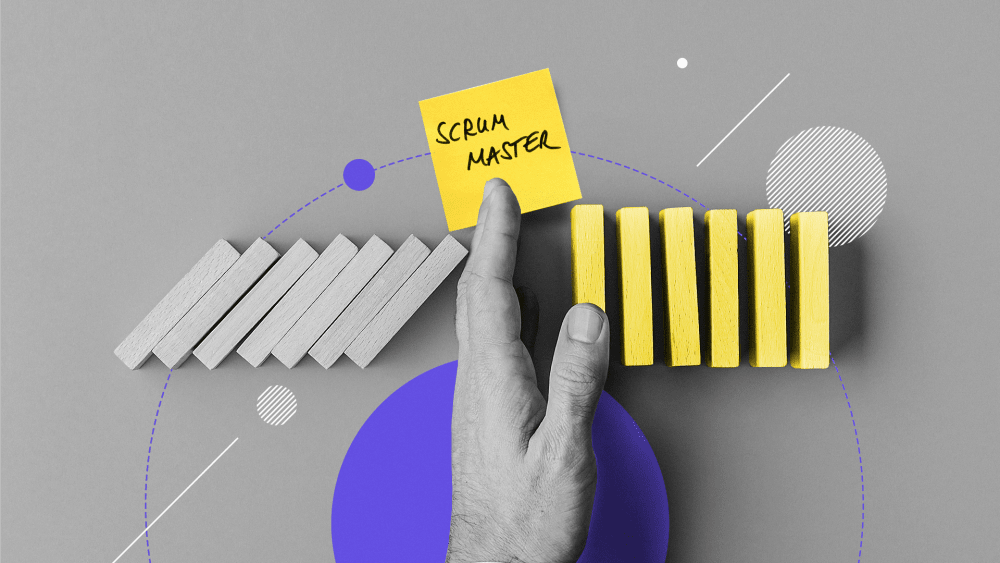Is a scrum master a project manager? The role of the SM
What is a scrum master? Is a scrum master a manager of some kind, like a product manager or development manager? In this article, I will explain what is the role of the scrum master, as well as go through some similarities and differences between that role and more traditional managerial jobs. Because, spoiler alert, a scrum master is not a manager.

Table of contents
First things first, what is scrum, and what is a scrum team?
What is scrum?
The most straightforward definition of scrum is that it’s an agile project management framework which supports organizations in delivering valuable results. However, the official definition puts more emphasis on scrum as a tool that helps to provide companies with flexible solutions for complex challenges. It is used by software development teams most frequently but its principles can be applied to a variety of team-based work. Whatever the focus, work in scrum is planned and delivered in short iterative cycles called sprints. A sprint takes 1 to 4 weeks to accomplish and always ends with a potentially shippable product increment.
Scrum is centered around continuous improvement and adjusting to ever-changing factors. Its structure helps teams to adapt to new user requirements, business conditions, and other considerations. In fact, re-prioritization is a part of the process, and the short release cycles enable rapid improvements and easy flexibility.
Scrum was created by Ken Schwaber and Jeff Sutherland. Their book The Scrum Guide explains what scrum is, how it works in detail, and elaborates on the principles that guide a scrum team when developing products and making decisions.
According to its creators, scrum is easy to understand but difficult to master. It organizes teamwork around a few specific types of meetings (called scrum events), tools (called scrum artifacts), and accountabilities (called scrum roles).
What is a scrum team?
A scrum team is a self-organised & cross-functional group that works together to set and achieve product goals. There are three types of roles that collaborate within the team: the product owner, the scrum master, and developers. Together they are accountable for the delivery of product improvements.
Scrum teams are:
- Small: they usually have up to 10 members, and there are no sub-teams.
- Self-organizing: they choose how to best accomplish their work, as opposed to being directed by people outside the team. The team has total autonomy to choose HOW things get done. They get to decide how to distribute workload and responsibilities between people within the team and which tools to use to track the work.
- Cross-functional: between them they have all the necessary skills to deliver a product.
What does a scrum master do?
The scrum master supports the process on three levels: the developers, the product owner, and the whole organization.
At level one, the scrum master is accountable for the team’s effectiveness, mainly guiding how they handle the backlog, in order to help them create high-value increments. When it’s needed, a scrum master delivers self-management coaching and facilitates the team’s cross-functionality. The scrum master also ensures team members keep the scrum events productive, including following the Scrum Guide.
The second level of the scrum master’s responsibilities is directly linked to the role of the product owner. A product owner can count on the scrum master’s help in the following areas:
- choosing effective methods for defining product goals and managing the backlog,
- ensuring the product owner knows the value of a well-prepared and clear backlog, and knows how to create it,
- planning for a process that takes place in a dynamically changing environment.
As you can already see, scrum masters have their hands full with various tasks and accountabilities. Yet, the list is not complete. The scrum master role serves not only the developers and the product owner, but also the organization as a whole. At this third level, they educate and coach various groups of employees on how to make the best use of the scrum framework in their daily work. He also helps stakeholders to understand the empirical nature of scrum.
Do you want to know more? See our free Ultimate Scrum Master Toolkit!
What does a Project Manager do?
The project manager orchestrates project success across organizational levels: the project team, stakeholders, and the broader organization.
At the foundational level, the project manager oversees team performance, focusing on resource allocation and task scheduling to meet deadlines. They lead the team, ensuring members have the necessary tools and information to perform their duties. This role also involves conflict resolution, fostering collaboration, and keeping team morale and productivity high.
Interacting closely with stakeholders constitutes the second level of the project manager’s duties. They align stakeholder expectations with the project’s objectives and progress, manage communications, negotiate resources, and handle risk management by proactively addressing potential issues.
At the organizational level, project managers ensure that projects align with corporate objectives and champion best practices in project management. They provide training to improve departmental processes and assess project outcomes to enhance future initiatives. This comprehensive leadership not only drives projects to successful conclusions but also advances the organization’s project management capabilities.
The role of a project manager is not specific to any single product development framework. It is a versatile and fundamental position that can adapt to various methodologies and business environments.
What is the role of the scrum master in a scrum team?
The primary responsibilities of the scrum master are coaching, training, optimizing, and facilitating.
But how exactly is their work supposed to help the other roles in a scrum team?
The scrum master supports the product owner with backlog prioritization, helps choose and conduct suitable workshops, makes refinements, and helps to create a more effective product development environment. Additionally, the scrum master ensures that everyone in the scrum team is aware of the goal, scope, and product domain of the work they are doing.
At the same time, the scrum master supports the developers by helping them self-organize, work cross-functionally, and focus on their current priority (the Sprint goal) to deliver the product increments in an efficient and agile way. In addition, they support the team by removing obstacles to the product development process, for example, by getting rid of unnecessary approval processes, streamlining communication, and understanding and addressing anything causing frustration or delays. They also help to keep the product backlog short, clear, and up to date.
What is the role of the scrum master in an organization?
The role of the scrum master is not limited to interactions within a scrum team. The Scrum Guide defines a scrum master as a servant leader. While it is a leadership role, it doesn’t come with the actual authority typical of managerial positions. A scrum master should lead from a position of influence, not formal authority.
People filling this role should work closely with different stakeholders within an organization, be it their peers, managers, leaders, or up to C-level executives, and be able to influence them. Moreover, they are supposed to lead and coach organizations in scrum adoption and facilitation. So, apart from dealing with scrum workload-related tasks, there is an extra layer to the role of the scrum master, and it is leadership.

Who is a certified scrum master? How to become one?
There are multiple ways to become a scrum master. Some companies require official certification for this role, or, if a scrum master is recruited from the current team, the company usually sponsors a certification process at some point.
The most recognized certification is the certified scrum master issued by scrum.org.
So, what is a certified scrum master? Simply put, a person who has passed the professional scrum master assessment or achieved another valid certification that proves their understanding of the theory and practice of scrum. This knowledge requires hands-on experience and continuous learning.
Is a scrum master a manager?
At this point, we have a comprehensive understanding of a scrum master’s role. However, before we answer whether a scrum master is a manager or not, we need to define what a manager is.
The Cambridge Dictionary defines a manager as someone whose job is to control or organize someone or something, esp. a business.
Managers are in charge of a company or a department, as well as the people who work in it. Traditionally, they are assigned KPIs, and their work consists of managing people and company resources to achieve business goals. An important aspect that differentiates a manager from other employees is authority. A manager can:
- hire and fire,
- set goals,
- prepare plans,
- evaluate performance,
- monitor attendance,
- approve vacations,
- discipline.
A manager is a role, and management is an activity performed by managers but also other people in both professional and private situations.
So, now we can finally answer the main question, is a scrum master a manager?
The answer is: No!
A scrum master is not a manager from an organizational point of view, although they may handle various management tasks on a daily basis.
Like all things agile, scrum promotes a different approach to collaboration, team structure, and authority, but it does not disregard the activity of managing. Instead of management, a scrum master’s power comes from leadership. This is a very important difference that arises from the specifics of an agile work culture and its associated flat structure.
A scrum master does not manage people since a scrum team is self-organizing and autonomous. An interesting comparison I once heard is that a scrum master is like a mechanic. Their job is not to drive the car but to make sure it works properly by fixing its parts, making adjustments, and ensuring it’s used correctly.
Is a scrum master a project manager?
A common question raised by organizations during agile transformations is whether a scrum master is a project manager. First, let’s be clear, a scrum master is not a project manager.
- A project manager is a traditional management role that ensures work is done from a position of control.
- A scrum master is a team member, a collaborator, that helps the team to master scrum in order to deliver the work in the best possible way. In scrum, there is no top-down management; again, the teams are self-organizing, so they learn how to best manage themselves rather than being directed by someone at the top.
In some organizations, scrum masters often collaborate with managers, such as product managers who focus on product strategy. At Boldare, we work with no managers at all - you can read more about this topic in the article: Benefits and practical aspects of working without project managers.
Conclusion
In agile organizations, the structure is horizontal, so most management activities are performed horizontally. This means that the teams are self-organizing. All roles require some managerial skills as opposed to more traditional companies with vertical structure, where management is executed vertically and vested in a specific few.
Scrum masters can be thought of as wise leaders who engage and influence people across the whole organization. They serve the business and teams by identifying and eliminating wasteful activities and blockers, optimizing workflows, adapting management styles, or ensuring processes are adjusted for the most effective delivery.
Are you curious how it feels to join Boldare as a Scrum Master? Visit our career page and check the current vacancies!
\
FAQ
Q: How do scrum masters handle conflicts within a team?
A: Scrum masters play a crucial role in facilitating conflict resolution within their teams. They approach conflicts by fostering an environment of open communication and collaboration. Through their skills in facilitation and mediation, scrum masters encourage team members to express their concerns and differences constructively. They guide discussions toward solutions that align with the team’s goals and the agile principles of mutual respect and collective responsibility. By maintaining neutrality and promoting empathy, scrum masters help resolve disputes efficiently, ensuring that conflicts do not derail the team’s progress.
Q: What are the career progression opportunities for a scrum master within an organization?
A: Career progression for a scrum master within an organization can vary widely depending on the company’s structure and the individual’s aspirations. Typically, a scrum master might advance to more senior scrum roles, such as a senior scrum master or agile coach, where they would oversee multiple scrum teams or focus on refining the organization’s agile practices. Another path could lead to strategic roles like an agile project manager or product owner, where they can leverage their deep understanding of agile methodologies to guide larger projects or product strategies. For those interested in broadening their influence on business practices, positions in agile transformation or enterprise agility are also potential next steps, involving coaching and leadership across the organization to enhance agile adoption and effectiveness.
Q: How does the role of a scrum master differ in organizations that combine agile with other project management methodologies?
A: In organizations that combine agile with other project management methodologies, the role of a scrum master can expand to include bridging the gap between different teams and methodologies. This hybrid role may involve translating agile practices into frameworks that other parts of the organization use, such as Waterfall or PRINCE2, ensuring a cohesive approach to project management that respects both agile and traditional processes. The scrum master in such environments often becomes a key facilitator of communication and integration, helping to align project goals and timelines across different operational teams. They must navigate the complexities of varied methodologies, advocating for agile principles while ensuring that projects remain on track according to the broader organizational standards and schedules. This role requires a versatile understanding of both agile and traditional project management principles, making it uniquely challenging and critical to the success of complex, multi-methodology environments.

Share this article:









